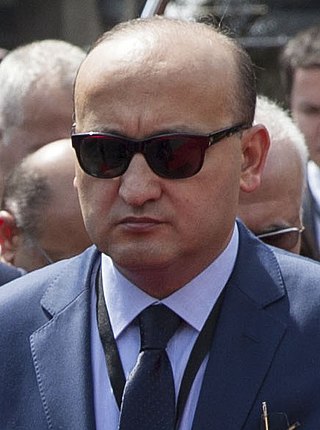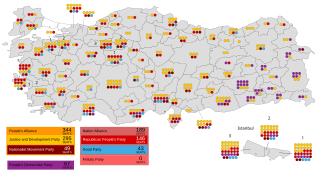
Ali Babacan is a Turkish politician, economist, and engineer. He is the founder and current leader of the Democracy and Progress Party (DEVA). He served 13 years as the Minister of Foreign Affairs, Minister of Economy, Chief Negotiator for the EU and Deputy Prime Minister of Turkey from 2002 to 2015. He was a member of the parliament as well.

Ahmet Davutoğlu is a Turkish academic, politician and former diplomat who served as the 26th Prime Minister of Turkey and Leader of the Justice and Development Party (AKP) from 2014 to 2016. He previously served as Minister of Foreign Affairs from 2009 to 2014 and chief advisor to Prime Minister Recep Tayyip Erdoğan from 2003 to 2009. He was elected as an AKP Member of Parliament for Konya in the 2011 general election and was reelected as an MP in both the June and November 2015 general elections. He resigned as prime minister on 22 May 2016.

Binali Yıldırım is a Turkish politician who served as the 27th and last prime minister of Turkey from 2016 to 2018 and Speaker of the Grand National Assembly from 2018 to 2019. He was Leader of the Justice and Development Party (AKP) from 2016 to 2017, then becoming parliamentary leader until 2018.

Numan Kurtulmuş is a Turkish politician and academic who is currently the speaker of the Grand National Assembly.

General elections were held in Turkey on 12 June 2011 to elect the 550 members of Grand National Assembly. In accordance to the result of the constitutional referendum held in 2007, the elections were held four years after the previous elections in 2007 instead of five.
The Zirve University was a private university established in 2009, located in Gaziantep, southeastern Anatolia, Turkey. The university had eight faculties. It was a mix-oriented institution. English language was the primary medium of teaching in College of Engineering, College of Architecture and Design, and College of Economics and Administrative Sciences. Turkish language was the primary medium of teaching for the rest of colleges while several courses were also offered in English. The university had total enrollment of more than 8,000 undergraduate and graduate students in 2016.

Yalçın Akdoğan is a Turkish politician who served as Deputy Prime Minister of Turkey from 2014 to 2016. A member of the ruling Justice and Development Party (AKP), Akdoğan became a Member of Parliament representing Ankara's first electoral district at the 2011 general election and was re-elected in June 2015.

The First Cabinet of Ahmet Davutoğlu was the 62nd government of the Turkish Republic, which took office on 29 August 2014. It was the fifth majority government to be formed entirely by the Justice and Development Party (AKP) and was headed by its leader and the 26th Prime Minister of Turkey, Ahmet Davutoğlu. The government assumed office during the 24th parliament of Turkey and succeeded Erdoğan's third cabinet. Davutoğlu is the third AKP politician to take office as Prime Minister, after Abdullah Gül (2002–2003) and Recep Tayyip Erdoğan (2003–2014).
The 5th Justice and Development Party Ordinary Congress was a party convention of the governing Turkish Justice and Development Party that took place on 12 September 2015. It was held six weeks before Turkey voted in a snap general election in November 2015. The agenda included motions to alter the party's by-laws to lift the three-term limit for the party's MPs who had been elected for a third time in the June 2015 general election, as well as the establishment of a 'Founding Principles Board'.

The Justice and Development Party election campaign of June 2015 was the official election campaign of the Justice and Development Party (AKP) for the June 2015 general election. This was the fourth general election contested by the AKP, which was founded in 2001 and swept to power in a landslide victory in 2002. This was the first election contested by the AKP's new leader, Ahmet Davutoğlu, who was elected leader in September 2014 after the party's former leader Recep Tayyip Erdoğan was elected as the President of Turkey in August 2014.

The Third Davutoğlu Cabinet is the 64th government of the Republic of Turkey. The government came into effect after the Justice and Development Party (AKP), led by Prime Minister Ahmet Davutoğlu, won a parliamentary majority of 84 in the November 2015 general election with 317 seats in the Grand National Assembly and 49.5% of the vote.

Sema Ramazanoğlu is a Turkish politician from the Justice and Development Party (AKP) who served as the Minister of Family and Social Policy in the third cabinet of Prime Minister Ahmet Davutoğlu from 24 November 2015 to 24 May 2016. She is the second cabinet minister of Turkey to wear a headscarf, after her predecessor as Family and Social Policy Minister Ayşen Gürcan. She serves as a Member of Parliament for the electoral district of Denizli since being elected in the snap general election on 1 November 2015.

The Pelican files refer to an unattributed list of 27 different items released in April 2016 detailing points of conflict between the Turkish Prime Minister Ahmet Davutoğlu and President Recep Tayyip Erdoğan, two politicians from the Justice and Development Party of Turkey who assumed their respective offices on 28 August 2014. Released by unnamed Erdoğan supporters as a WordPress.com blog, the files heavily criticised Davutoğlu for disobeying Erdoğan's political agenda. The release of the files were widely attributed to sparking the events that would eventually lead to Davutoğlu being ousted as Prime Minister. The name "Pelican files" is a reference to the 1993 political thriller The Pelican Brief.

Veysi Kaynak is a Turkish politician from the Justice and Development Party (AKP) who currently serves as a Deputy Prime Minister of Turkey in the government of Binali Yıldırım since 24 May 2016. He is a Member of Parliament Kahramanmaraş since the June 2015 general election, having previously served from 2007 to 2011.

Parliamentary elections were held in Turkey on 24 June 2018 as part of general elections, with presidential elections taking place on the same day. Originally scheduled for 27 October 2019, President Recep Tayyip Erdoğan called snap elections on 18 April after months of speculation. With the passage of a series of constitutional amendments in the 2017 referendum, the number of MPs will be increased from the previous 550 to 600. These representatives will be elected by the constituents of the 87 electoral districts of Turkey by party-list proportional representation.

The June 2019 Istanbul mayoral election was held on 23 June 2019. It was a repeat of the March 2019 mayoral election, which was annulled by the Supreme Electoral Council (YSK) on 6 May 2019. The original election had resulted in a narrow 0.2% margin of victory for opposition candidate Ekrem İmamoğlu, causing the governing Justice and Development Party to successfully petition for a by-election.

The Democracy and Progress Party is a Turkish political party founded on 9 March 2020 under the leadership of Ali Babacan, a former economy minister under the AKP. The official abbreviation is "DEVA" according to the party records. The party's logo is a water droplet, inside a silhouette of sapling.


















